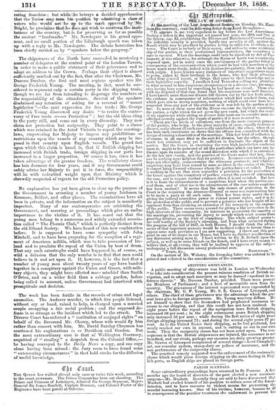Arnputif. .• iiiifLAW D1VOSCE. At lim o nte.eting of the taw Amendment
Siatiety on Monday, Mr. Bast- in gs,the, secretary, read the4ellowing,letter iroui.Lord Brougham_ " It .appetu-s to me very expedient to lay before the Law Amendment Society a-defect iu the important act passed last year, the 20th and 21st of the Queen, cap. 85, establishing the Divorce and Matrimonial Causes Courts. No sufficient security is provided, hardly any security at all, against tbe frauds which May be practised by parties acting in collu-ion to obtain a di.. vorce. The Court is en.irely at their merry, and unless by some accidental slip of the parties, or their professional representatives, the conspiracy is sure to succeed. When the marriage could only he dissolved by Act of Par- liament, it +teas Otherwise, for although the House of Lords Was occasionally imposed upon, yet in many cases the contrivances-of the parties failed in oonsequence of the eommunication which could be had with members of the house mitehmiore freely, indeed with fearless irregelarity, than ran be held with judges. I have known many instances of important suggestions made to peers, tither by their brethren in, the house, who had their attention called from general report, or things that Game to their knowledge not in their legislative capacity. I recollect Lord Tenterden calling my attention to what seemed to him suspicious circumstances in a divorce ease, his suspi- cion having been roused by something he bad heard on circuit. Those who with itie dispeded et`that case found that his suspicions were well founded. I have known more than one divorce bill thrown out by the law lords sifting the evidence in consequence of information which had reached them, and which gave rise to strong suspicion, nothing of which could ever have been suspected from any part. of the evident* as it was left by the parties at the bar, In none et these cases dicIthe House exercise its right of examining the parties, a right which the act gives the new court, but which the result of my experience while sitting on divorce bills leads me to consider most in- effectual security against the frauds of parties if it were resorted to. • "There are two kinds of collusions, one from the mere common purpose of the parties, who being, in the great majority of cases, equally desirous of divorce, make almost all such cases really undefended ; the other, when there has been such connivance as shows that the offence was committed with the design of causing a dissolution of themareiage. This last kind of collusion is, of course, in all eases fatal to the suit for divotce, hot the other, though much less criminal, may yet be sufficient to frustrate the object of the parties. Bet the Court, in exercising the very high jurisdiction conferred upon it,. Ought to be possessed of all the particulars which can have any in- fluence upon its exercise et the sound discretion with which it is entrusted. As the law now stands, and the practice of the Court under that law, there eau be nothing more helpless that its position. It cannot conveniently, per- haps not effectually, cross-examine the witnesses produced ; and whatever suspicions May have been roused by some accident in the course of the trial, it cannot:bring forward witnesses whom the parties have uot called. There is nothing in the act that even resembles a provision for the protection of the Court against the conspiracy of parties, except the power of adjourning the case, and to require further-evidence when it is not satisfied. But how is it to learn the eireutnstanees of a suspicions kind when the parties con- ceal them, and of what use is the adjournment of the case unless suspicion has been• excited ? It seems that .the only chance of protection to the Court is the requiring the Attorney-General or some one representing him to be made a party in all such. cases. This has been done under the act giving the judicial committee power to extend patent rights, and it is for the protection ofthe public and to prevent a patentee who has bought off his opponent from thus obtaining an extension of his monopoly at the expense of the public. There seems every ground for giving a like protection to the high interests of the community, its interests in preserving the sanctity of the marriage tie, preventing the injury to morale which must accrue from granting divorces as the fruit of conspiracy. The whole subject seeme, to me well worthy of the Society's attention, and from what occurred during the progress of the bill of 1857, in both Houses, I -should think the adver- saries of that important measure would be inclined rather to favour than to oppose some such provision as I am now suggesting. I threw out this pro- posal in one of its stages in our House but I have no distinct recollection of any discussion arising upon it. I have written to Sir R. Bethel' upon the subject, as well este some friends on the bench, and I have every reason to beheve that, at all events, they will be inclined to approve of the subject undergoing a full discussion among professional men. "Yours, &c., BROUORAII." ()lithe motion of Mr. Webster, the foregoing letter was ordered to be printed and referred to the consideration of the committee.


























 Previous page
Previous page